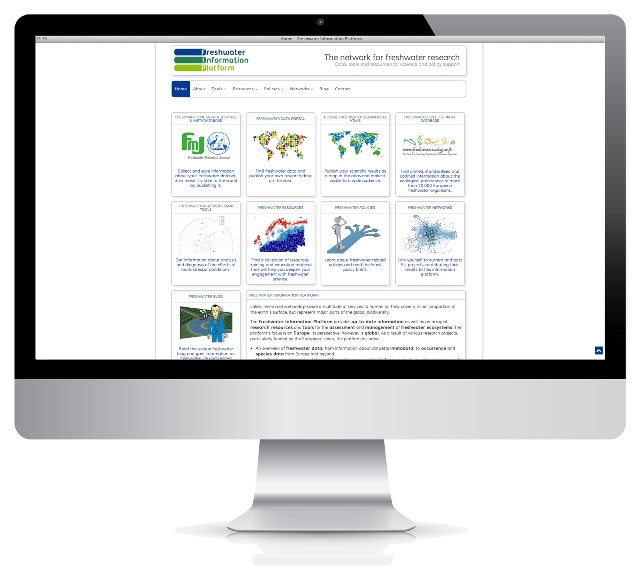May 8 2015
Four European research institutes have launched an online platform to make information from a large set of freshwater ecosystem research activities accessible to all. The Freshwater Information Platform offers a forum for information exchange and open-access publishing of maps and data, and aims to stimulate cutting-edge research and collaborations in the field. The Platform provides a unique and comprehensive knowledge base for sustainable and evidence-based management of our threatened freshwater ecosystems and the resources they provide.
 Screenshot of the launched Freshwater Information Platform.
Screenshot of the launched Freshwater Information Platform.
Pressures such as water pollution, intense land-use and climate change are increasingly threatening the health and diversity of European freshwater ecosystems. Over recent years, many European Union funded research projects have investigated the causes of these pressures and their effects on rivers, lakes and wetlands, and developed appropriate rehabilitation strategies. However, access to and use of the data generated by these projects is often difficult for water managers, policy makers, scientific communities and the general public. This is, because scientists have not yet fully adopted systematic data publishing practices and data embedded in the huge number of scientific papers and research project websites are challenging to extract.
In order to make this detailed and wide-ranging knowledge of freshwater ecosystems accessible to all, four European research institutes in Austria, Belgium and Germany have joined forces to launch the Freshwater Information Platform (www.freshwaterplatform.eu), an interactive website integrating results and original data stemming from finished, ongoing, and future freshwater research projects.
The platform contains several complementary sections, either providing access to original data or summarising research results in an easily digestible way. All sections are composed as ‘living documents’ that will be continuously improved and updated.
The “Freshwater Biodiversity Data Portal” provides access to data on the distribution of freshwater organisms (such as fishes, insects and algae), both in Europe and worldwide, whilst the “Global Freshwater Biodiversity Atlas” provides a series of maps on freshwater biodiversity richness, threats to freshwaters (or ‘stressors’) and the effects of global change on freshwater ecosystems.
The “Freshwater Species Traits Database” integrates the knowledge on the ecology of around 20,000 species inhabiting European freshwater ecosystems, including information about where species live, what they feed on or how tolerant they are to pollution.
The “Freshwater Metadata” section provides an overview of hundreds of major data sources related to freshwater research and management and offers the option to publish such data in the Freshwater Metadata Journal.
The vibrant and widely-read “Freshwater Blog” publishes features, research highlights, interviews and podcasts on freshwater science, policy and conservation. The Freshwater Information Platform also provides a collection of research tools, information about freshwater-related policies and relevant European and global networks relating to freshwater science and policy.
Astrid Schmidt-Kloiber (BOKU): “Freshwater environments are subject to numerous damaging pressures leading to a significant threat to their biodiversity. The Freshwater Information Platform helps freshwater scientists to overcome the challenging task to find scattered research resources, by pooling relevant information in one single place. This will help improve the understanding of freshwaters and provide a stronger voice for their conservation.”
Daniel Hering (UDE): “The efficiency of freshwater ecosystem protection and restoration is largely driven by the quality of scientific data that it relies on. The identification of sensitive areas and species, the development of restoration measures and the prediction of climate change effects: all are complex scientific tasks requiring high-quality data. The Freshwater Information Platform is an extremely valuable resource in providing the evidence needed to guide successful and sustainable freshwater management and policy."
Aaike De Wever (RBINS): “Through the Freshwater Biodiversity Data Portal – integrated in the Freshwater Information Platform – we encourage scientists to publish their data on species observations online. By bringing together a large number of freshwater datasets we want to support large-scale environmental analyses and modelling, which improves our understanding and capacity to manage freshwater environments.”
Klement Tockner (IGB): “We are fundamentally and in most cases irreversibly altering how the natural world functions. The consequences for natural systems on which we depend are such that they may threaten our own survival. The Freshwater Information Platform provides a shared research infrastructure of global relevance that facilitates tracing the multifaceted consequences of the accelerating environmental change on freshwater resources and biodiversity.”